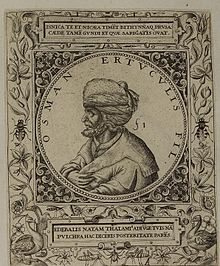Osman Gazi
| Osman Gazi عثمان غازى |
|||||
|---|---|---|---|---|---|
| Bey Ghazi |
|||||

Engraving of Osman I
|
|||||
| 1st Ottoman Sultan (Bey) | |||||
| Reign | c. 1299 ‒ 1323/4 | ||||
| Successor | Orhan | ||||
| Born | Unknown | ||||
| Died | 1323/4 | ||||
| Consorts |
Malhun Hatun Rabia Bala Hatun |
||||
|
|||||
| Dynasty | House of Osman | ||||
| Father | Ertuğrul | ||||
| Mother | Unknown | ||||
| Full name | |
|---|---|
| Osman bin Ertuğrul |
Osman Gazi (Ottoman Turkish: عثمان غازى ʿOsmān Ġāzī; or Osman Bey or Osman Alp); (died 1323/4), sometimes transliterated archaically as Othman, was the leader of the Ottoman Turks and the founder of the Ottoman dynasty. He and the dynasty bearing his name later established and ruled the nascent Ottoman Empire (then known as the Ottoman Beylik or Emirate). The state, while only a small principality during Osman's lifetime, transformed into a world empire in the centuries after his death. It existed until the abolition of the sultanate in 1922, or alternatively the proclamation of the Republic of Turkey in 1923 or the abolition of the caliphate in 1924.
Due to the scarcity of historical sources dating from his lifetime, very little factual information is known about him. Not a single written source survives from Osman's reign. The Ottomans did not record the history of Osman's life until the fifteenth century, more than a hundred years after his death. Because of this, it is very challenging for historians to differentiate between fact and myth in the many stories told about him. One historian has even gone so far as to declare it impossible, describing the period of Osman's life as a "black hole."
According to later Ottoman tradition, Osman's ancestors were descendants of the Kayı tribe of Oğuz Turks. The Ottoman principality was just one of many Anatolian beyliks that emerged in the second half of the thirteenth century. Situated in the region of Bithynia, Osman's principality was particularly well-placed to launch attacks on the vulnerable Byzantine Empire, which his descendants would eventually go on to conquer.
Some scholars have argued that Osman's original name was Turkish, probably Atman or Ataman, and was only later changed to the Arabic ʿOsmān. The earliest Byzantine sources, including Osman's contemporary George Pachymeres, spell his name as Ατουμάν (Atouman) or Ατμάν (Atman), whereas Greek sources regularly render both the Arabic form ʿUthmān and the Turkish version ʿOsmān with θ, τθ, or τσ. An early Arabic source mentioning him also writes ط rather than ث in one instance. Osman may thus have adopted the more prestigious Muslim name later in his life.
...
Wikipedia
